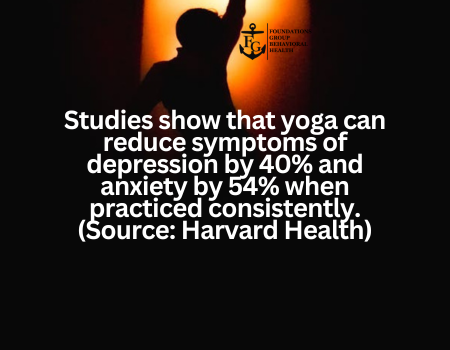Yoga, an ancient practice rooted in mindfulness, physical movement, and breath control, has become a cornerstone of holistic health and well-being. Beyond its benefits for physical fitness, yoga is increasingly recognized as a powerful tool in the recovery process for mental health and addiction. By addressing the interconnectedness of the mind, body, and spirit, yoga complements traditional treatment approaches, offering individuals a pathway to sustained healing.
At Foundations Group Behavioral Health, we integrate yoga into our mental health programs, including Psychiatric Day Treatment, Half-Day Treatment Programs, and Outpatient Mental Health Programs, to help individuals manage symptoms, foster emotional balance, and build resilience.
Understanding the Recovery Process
Recovery is a multifaceted journey that involves addressing not only the physical aspects of healing but also the emotional, psychological, and spiritual dimensions. Whether it’s recovery from a mental health condition, addiction, or trauma, the process requires tools that promote self-awareness, emotional regulation, and stress management—areas where yoga excels.
Key Challenges in Recovery
- Emotional Turmoil: Recovery often involves processing complex emotions like guilt, shame, and anxiety.
- Stress and Triggers: Daily stressors and unresolved trauma can act as triggers, increasing the risk of relapse.
- Physical Strain: Addiction and mental health conditions take a toll on the body, leading to fatigue, pain, and tension.
- Disconnection: Many individuals in recovery struggle with a sense of disconnection from themselves and their surroundings.
Yoga addresses these challenges holistically, offering physical, mental, and emotional support.
The Science Behind Yoga in Recovery
Yoga is not just a spiritual practice—it has a solid foundation in neuroscience and physiology. Regular practice promotes changes in brain function and structure that are particularly beneficial for individuals in recovery.
1. Reduces Stress and Anxiety
Yoga lowers cortisol levels (the body’s primary stress hormone), helping to reduce feelings of anxiety. It activates the parasympathetic nervous system, which promotes relaxation and counters the “fight or flight” response.
- Supporting Evidence: A study published in Frontiers in Psychiatry found that yoga reduces symptoms of anxiety by enhancing GABA (gamma-aminobutyric acid), a neurotransmitter associated with calming effects.
2. Enhances Emotional Regulation
Practicing yoga improves connectivity in brain regions responsible for emotion regulation, such as the prefrontal cortex and amygdala. This helps individuals respond to emotional triggers in healthier ways.
- Supporting Evidence: Research in the Journal of Psychiatric Research indicates that yoga improves emotional stability and decreases emotional reactivity, making it a valuable tool in recovery.
3. Improves Sleep Quality
Insomnia and disrupted sleep are common in recovery. Yoga promotes better sleep by calming the mind and reducing physiological arousal.
- Supporting Evidence: A 2020 study in Behavioral Sleep Medicine found that individuals who practiced yoga reported a 55% improvement in sleep quality.
How Yoga Supports Mental Health Recovery
1. Managing Anxiety and Depression
Yoga’s combination of mindfulness, breathwork, and movement is particularly effective for individuals dealing with anxiety and depression.
- Benefits for Anxiety: Yoga reduces hyperactivity in the amygdala, the brain’s fear center, helping individuals feel more grounded and less overwhelmed.
- Benefits for Depression: By increasing serotonin production and reducing inflammation, yoga helps alleviate depressive symptoms.
Programs at Foundations Group Behavioral Health:
- Our Anxiety Treatment Program integrates yoga to teach grounding techniques and stress management.
- The Depressive Disorder Treatment Program incorporates yoga to improve mood and foster self-compassion.
2. Building Emotional Resilience
Recovery often involves navigating emotional highs and lows. Yoga fosters emotional resilience by helping individuals observe and process their emotions without judgment.
- Mindfulness in Action: Yoga encourages a focus on the present moment, helping individuals break free from cycles of rumination and worry.
- Breath Awareness: Controlled breathing techniques, such as pranayama, activate the relaxation response and promote emotional balance.
3. Enhancing Mind-Body Connection
Recovery often involves rebuilding trust in oneself, including the connection between mind and body. Yoga strengthens this connection through deliberate movements and physical awareness.
- Body Awareness: Practicing yoga helps individuals recognize physical sensations and emotions, fostering a deeper understanding of their triggers and needs.
- Self-Empowerment: Successfully holding a pose or completing a session boosts self-esteem and encourages self-confidence.
How Yoga Supports Addiction Recovery
Addiction recovery presents unique challenges, including cravings, withdrawal symptoms, and the need to rebuild a sense of purpose. Yoga provides tools to address these challenges holistically.
1. Managing Cravings
Yoga helps individuals navigate cravings by redirecting their focus and calming their nervous system.
- Breathing Techniques: Pranayama exercises, such as alternate nostril breathing, reduce stress and interrupt the cycle of cravings.
- Mindful Movement: Yoga encourages individuals to stay present, reducing the intensity of compulsive thoughts.
2. Rebuilding Physical Health
Addiction often leaves the body weakened, with issues like chronic pain, fatigue, and poor posture. Yoga promotes physical healing by:
- Enhancing flexibility and strength.
- Boosting circulation and oxygenation.
- Reducing chronic pain and tension.
3. Supporting Spiritual Growth
For many individuals in recovery, reconnecting with a sense of purpose or spirituality is a critical component of healing. Yoga provides a non-religious pathway to explore spirituality through mindfulness and introspection.
Types of Yoga Beneficial in Recovery
Different styles of yoga cater to various needs in the recovery process:
1. Hatha Yoga
- Focuses on basic postures and breathing techniques.
- Ideal for beginners and individuals looking for a gentle introduction to yoga.
2. Restorative Yoga
- Involves passive, supported poses held for extended periods.
- Promotes deep relaxation and emotional healing.
3. Trauma-Informed Yoga
- Tailored for individuals with a history of trauma.
- Prioritizes safety, choice, and empowerment in each session.
4. Kundalini Yoga
- Combines dynamic movements, breathwork, and meditation.
- Encourages self-awareness and emotional release.
Yoga in Mental Health Treatment Programs
At Foundations Group Behavioral Health, yoga is a core component of our holistic treatment approach:
1. Psychiatric Day Treatment
- What It Offers: Intensive support for individuals with significant mental health challenges.
- Role of Yoga: Helps manage stress, regulate emotions, and build mindfulness skills.
2. Half-Day Treatment Programs
- What It Offers: Flexible care for individuals balancing recovery with personal or professional responsibilities.
- Role of Yoga: Supports stress management and encourages healthy routines.
3. Outpatient Mental Health Programs
- What It Offers: Therapy and support for individuals managing mild to moderate symptoms.
- Role of Yoga: Enhances emotional resilience and promotes physical well-being.
4. Co-Occurring Disorder Treatment Programs
- What It Offers: Integrated care for individuals with mental health and substance use challenges.
- Role of Yoga: Addresses the physical and emotional aspects of recovery, fostering holistic healing.

Getting Started with Yoga in Recovery
1. Begin with Simple Practices
Start with short sessions that focus on gentle stretches and breathing exercises.
2. Create a Consistent Routine
Practicing yoga regularly maximizes its benefits for recovery.
3. Find a Supportive Environment
Join yoga classes designed for recovery or trauma-informed practices to ensure a safe and supportive experience.
4. Incorporate Yoga into Professional Treatment
Work with mental health professionals to integrate yoga into your personalized recovery plan.
Why Choose Foundations Group Behavioral Health?
At Foundations Group Behavioral Health, we offer a comprehensive approach to recovery that integrates yoga with evidence-based therapies.
What Sets Us Apart?
- Holistic Care: We address the mind, body, and spirit for sustainable recovery.
- Experienced Team: Our clinicians and yoga instructors have extensive expertise in trauma-informed care.
- Personalized Programs: Each treatment plan is tailored to meet your unique needs.
Take the First Step Toward Holistic Healing
Yoga is a transformative practice that empowers individuals to manage stress, build resilience, and reconnect with themselves during recovery. Whether you’re addressing mental health challenges, addiction, or co-occurring disorders, yoga can play a pivotal role in your journey.
Call us today at 888.685.9730 to learn more about our programs, including Psychiatric Day Treatment, Half-Day Treatment Programs, and Outpatient Mental Health Programs. Let us support your path to wellness—one breath at a time.
FAQ on Role of Yoga in Recovery
How does yoga help in the recovery process?
Yoga promotes holistic healing by reducing stress, improving emotional regulation, enhancing mindfulness, and rebuilding physical and mental well-being.
Can yoga help with anxiety and depression?
Yes, yoga reduces symptoms of anxiety and depression by calming the nervous system, boosting serotonin levels, and encouraging mindfulness practices that improve emotional balance.
What types of yoga are best for recovery?
Hatha, restorative, trauma-informed, and Kundalini yoga are particularly effective for individuals in recovery, focusing on relaxation, mindfulness, and emotional healing.
How does yoga reduce cravings in addiction recovery?
Yoga helps manage cravings by calming the mind, reducing stress, and teaching mindfulness techniques that redirect focus and reduce compulsive urges.
Is yoga suitable for beginners in recovery?
Absolutely! Yoga is accessible for individuals of all fitness levels and can be tailored to meet the needs of beginners. Gentle styles like restorative or Hatha yoga are great starting points.
How is yoga integrated into mental health treatment programs?
Programs like Psychiatric Day Treatment and Outpatient Mental Health Programs incorporate yoga to help individuals build resilience, manage stress, and enhance emotional and physical well-being.
Can yoga support recovery from co-occurring disorders?
Yes, yoga addresses both mental health and physical well-being, making it an effective tool in Co-Occurring Disorder Treatment Programs for individuals managing mental health conditions and substance use challenges.








